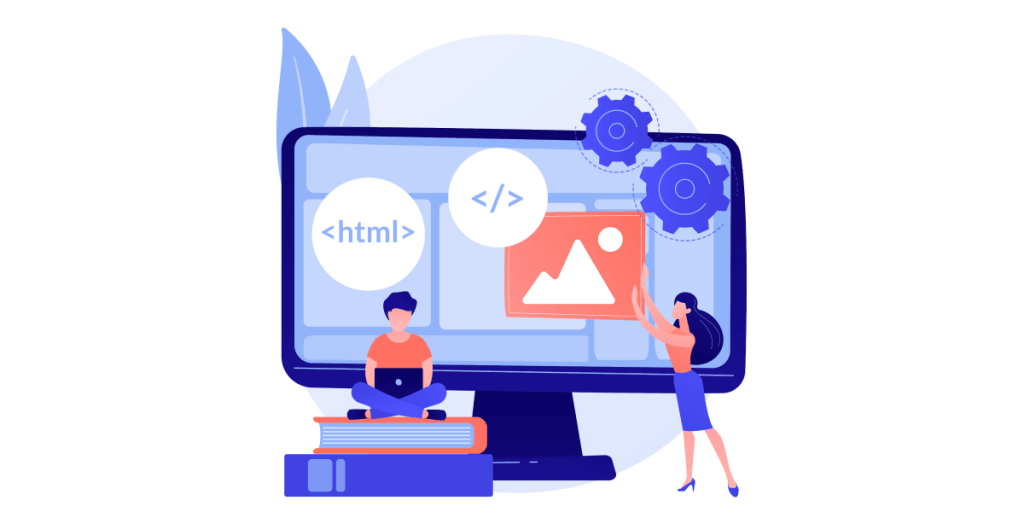Are One-Page Websites A Good Idea? What Businesses Should Use Them?
In a very competitive market, deciding between one-page websites and custom development can be precarious. Mobile searches and social media browsing are gaining more popularity among online users. More than that, their expectations are becoming more exigent. Both one-page websites and custom development have their benefits and disadvantages. This is why the business owner should understand the business needs and future goals to make the right decision from the start.
Nowadays, single-page websites are becoming a prevalent web trend. On the other hand, custom development, defined by navigation flow, is notorious and trusted by users.
The purpose of this article is to offer more information about one-page websites, the pros and cons of this implementation and what type of businesses should consider this solution.
What Are One-Page Websites?

One-page websites are straightforward websites that contain only one HTML page with no additional web pages such as About us, Contact us or Features pages. The content on a single-page website is fully loaded on the initial page. When it comes to navigation, when users click the navigation links on the one-page sites, they jump right to the destination on the page, or they will have to scroll down to reach the desired content section.
What makes these types of websites unique is the immersive feel and the smooth scrolling. Single page websites present all the information on the same page. The navigation links are anchors for different website sections of the page. The menu items have their own anchor link.
The purpose of a single-page website is to offer the exact amount of information for an online user to make a decision and act on it. Because of this, usually, the one-page website’s design is used for landing pages, product presentations, portfolios, and events. This is a content-oriented site that removes all the unnecessary website interface noise and focuses on catching the user’s attention.
What Are The Pros and Cons of Single Page Websites?
More and more business owners choose single-page websites over multi-pages websites to achieve their business needs and goals. Awwwards has a great collection of single-page sites and design trends that can inspire you. But even with the frenzy around this type of implementation, you should consider some crucial aspects such as SEO, user’s journey, website redesign, etc. Let’s explore together what are the benefits and the bottlenecks of one-page websites.
The Benefits of One-Page Websites
1. Flawless Mobile Experience

It is well known that the search volume from mobile devices has exceeded desktop searches. This is one of the most significant advantages of having a single-page website as it converts much easier to mobile, and mobile users find them more simple to navigate.
They also load very fast. Page speed is crucial for SEO (search engine optimization). This is a tremendous bonus for users that lack the patience to wait longer than two seconds for a website to load. Besides that, it is easier for people to navigate one-page websites as they do not require clicking on additional pages or tabs, which can be difficult on small devices such as smartphones.
Mobile page speed and website architecture are two critical factors that influence and contribute to an improved user experience and a smooth user journey.
2. Easier to Reach Your Target Audience
If you are looking to target a particular audience and bring them a specific type of user experience, a one-page website is the best solution. This type of website offers an easier control of user behaviour on your site and an easier way to direct them in the direction you want. Because all the information is embedded on the same page, users will get all the details in the right order. You decide how to order and present the information to satisfy your business needs and achieve your goal. Keep in mind that the purpose of a single-page website is to be simple, compact and easy to navigate. We recommend not losing you to details and unnecessary information because you can quickly turn off your visitors.
3. Get Higher Page Authority
Links are among the factors that determine how well a website will rank in the SERP (search engine results page). One of the best parts of a single-page website is that every link will point to the main website URL, so you will not have to worry about low-performance pages.
4. Clean and Comprehensive UI Design
User Interface design is one of the main factors when it comes to user engagement. A one-page website is divided into small chunks of content and removes the UI clutter. Also, it makes your website easier to digest by users. Besides that, we firmly believe that this type of website contributes to an intuitive and smooth user journey map. Because you do not have any additional pages, visitors will enjoy the flowy and linear website navigation. Imagine your website as a straightforward story with a clear and defined beginning, middle and end.
5. Increased Conversions

Because single-page websites are built with only one action in mind, your users will not get lost in details and have a clear mission. Studies showed that a one-page website could increase conversion rates by 37.5% because the sales process begins straight from the start, and users move through the funnel more quickly, without being lost or distracted by other offers or visual elements.
The Bottlenecks of One-Page Websites
1. Limited Keyword Targeting
One-page websites might be ideal for the user journey, but they do have some SEO drawbacks, such as keyword ranking. Because they are usually designed around one central concept, they limit your ability to rank for a broad collection of keywords. Multi-page sites rely on the opportunity to rank for a specific audience because each page is different and can target a distinct set of keywords. Let’s say your business relies heavily on finding new customers on Google, Bing or any other search engine. In that case, we strongly advise you to choose a multi-page website as it will serve your business purpose better. If Google search is not a priority for your business and the lack of keyword ranking is not affecting you, we suggest choosing a one-page website solution.
2. Limited Content Details

Another drawback of one-page websites is that their content is very general and not as specific as multi-page sites allow. Because you cannot dedicate a separate page for each subject you want to cover, all your information should be compressed into one page. We recommend you pay special attention to your website layout and organization to deliver the experience you want. Even if your design is astonishing, keep in mind that online visitors can be disappointed because of the lack of relevant content, especially when they are looking for very detailed content on a specific topic.
Our suggestion is to clearly define the sections for your content and create a new section for each topic, as you would do on a multi-page website. Based on your business industry, this will not affect your SEO or increase your bounce rate. Customers will be happy with the amount of information they get.
3. Limited Advanced SEO Strategies Implementation
One of the advanced SEO strategies that a one-page site cannot implement is siloing. Siloing means structuring your website’s content into major areas of interest, with the purpose of demonstrating authority in those areas. Simply put, you cannot organize your website into categories and subcategories to better emphasize your content. If you try to approach too many topics and subtopics, answering user’s questions and treat every subject in detail, your website will look disorganized and spammy.
4. Limited Scalability
Unfortunately, you cannot grow your brand with a one-page website. Its ability to scale is minimal as it is focused on having narrow content. It is not suitable for businesses that require complex and varied content, categories and subcategories. If you own a small business, we strongly recommend you think about your future business objectives. Keep that in mind when choosing between a single-page website or a multi-page website.
What Businesses Should Consider Implementing One-Page Websites?

Definitely, a one-page site is a fast way to get your business to work online, especially if you do not have a lot of content. Your website visitors can find all the information on one page, and by using the navigation bars, they can quickly jump to the section they want without waiting for a new page to load.
We encourage you to see the difference between a one-page website and a landing page. The main difference between these two is that the landing pages focus on conversion rates, while one-page websites can serve multiple purposes besides conversions.
In our opinion, one-page websites are ideal for portfolios, single-product promotion, events, personal websites, small businesses, and agencies.
To better depict one-page websites, we would like to list some of the best one-page site examples.
1. Apple Plugs (single-product promotion)
This website, Apple Plugs, is “A parody of the good folks at Apple”. What we want to underline with this example is the structure of the website. This could inspire your design process, customer journey maps and web structure: the visual hierarchy, negative space and funny content. As you explore the site, you are drowned by the text and visuals, and at the end, you find the conversion place, the signup form. The conversion place uses the centre alignment, which makes the page’s goal stand out, and increasing the likelihood of converting.
2. Plastic Unlimited (small business website)
We wanted to include Plastic Unlimited to display a concept of a one-page website that is a bit more complex and presents a reasonable amount of information without getting lost in unnecessary details. You can see a slider, services, gallery, about us, contact, and team details on the website. Instead of directing users to another page with extra information, a pop-up will appear when you click on the “+” sign. This solution is not disrupting the natural scrolling flow.
3. Cleverbirds (agency & portfolio presentation)
The Cleverbirds website is a beautiful combination between agency presentation and portfolio. This award-winning digital design company is using the one-page solution for an intelligent presentation and an eye-candy portfolio. On the website, you will find an autoplay slider, their portfolio, about and contact us sections. Each portfolio project can be clicked, and a pop-up overlay will provide more information about the project.
4. Andreas Beugger (personal website)
The website of Andreas Beugger is a single-page website that uses both horizontal and vertical scroll to present the information. In contrast with the website’s dark background, you see bold images and typography that create a profoundly engaging user experience. The website’s loading time is fantastic, the website is responsive, and the resume section is outstanding. Because Andreas offers UX/UI solutions, graphic design and photography services, his website is excellent proof of his work and creativity. Instead of a contact form, Andreas links his social media profiles. Do not be afraid to use emojis if your style allows it.
5. Banyak Surf Adventure (events/destination website)
Banyak Surf Adventure is a tourist destination website. The menu is descriptive, including information about the boat, the camp, the photo gallery and the booking section. They align the voice and tone of their content with the idea of travelling and having fun. The booking section is very intuitive, and new visitors can book a trip in no time. Their photo gallery is pulled from their Instagram account.
Our Advice

As we said in the previous chapters, one-page websites are not fit for SEO or advanced SEO strategies. Multi-page websites will give you more room to optimize them and focus your strategy on Google rankings.
Our advice is to analyze your business goals and what you want to accomplish with your website. It would be best to consider who your buyer persona is and what your target audience wants from your website.
We wanted to highlight what one-page websites can do and what type of services they are a good choice for. If you have a narrow focus and your users should perform only one task, this solution can be an excellent choice for you, mainly because it has a mobile-first design approach. On the other hand, multi-page websites allow you to reach a wider audience, optimize, implement complex SEO strategies, and write intricate content to attract organic traffic.
We firmly stand by offering your audience an engaging experience, making them return to your website, and making the information as accessible as possible. If a one-page website is not an option for you, check out our custom development solutions. Also, you can take a look at our portfolio and check our customer reviews. Contact us today, and let’s team up for a better business solution for you!
Frequently Asked Questions
A clear and linear structure, a conspicuous call-to-action, a narrow and to the point description of your product or services, portfolio or social proof and precise contact details.
Businesses that have only one product or focus only on one specific audience. Also, one-page websites are great for portfolios and event booking.
Yes, there are plenty of free one-page website builders online.
Yes, they are a good idea if your business model doesn’t need more than what this type of website can offer.